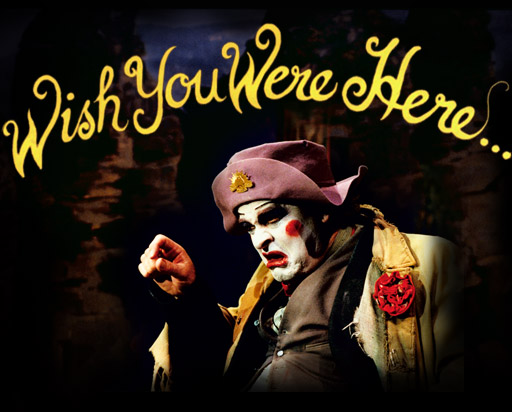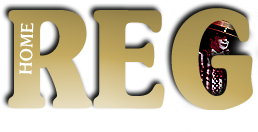
A cozy cabaret in the Mountains.
Following Barnum I wrote and performed the last of my large scale one-man shows, Firing Squad, its production unhappily coinciding with a nationwide recession; I remember particularly Melbourne where it played Her Majesty's during the winter of 1983. If you'd fired a cannon up the chill and windy streets at night you'd have hit nobody; there was nothing out there. Sadly, people weren't even taking cover inside our theatre. It was a depressing experience. Maybe the show was as well, for the spectator I mean, the content was all to do with the times, tough times and anger; for some it may have been a bit too close for comfort. Ah well.
A review by Harry Kippax in the Sydney Morning Herald was reassuring for the disappointed artist at least:
'Here is Reg Livermore at the top of his bent, riding high on a black juggernaut of a show that will be compulsive viewing for his admirers…quintessential Livermore, a sustained cry of outrage and pain, his white clown's face as implacable as a skull behind the flicker of accusing eye… His derision may upset some, for though its laughter, spurting from grotesque couplings of simile and metaphor, is irresistible, its anger is scorching. Livermore dominates all – and that includes the audience. He has the unchallengeable authority of the great individual performer. He fascinates rather than entertains. We have nobody more remarkable on our stage. But let me mislead nobody. This is entertainment, of its own kind, and bracing entertainment at that, as that twinkling, accusing skull face leads us with speech and fevered song, and icy discipline, across a tightrope above a sunless abyss. Trust him, go with him; laugh at his outrageousness; savour his outrage – but don't look down.'
With this behind me, further theatrical pursuit on that scale was the last thing on my mind; there wasn't any wind left in my sails. I went to ground, heading into a kind of semi-retirement; for five years I did nothing on stage, and not much anywhere else.
The Clarendon is a guesthouse and dinner theatre in Katoomba, not exactly salubrious, but quaint; of the few performance venues in the Blue Mountains the Clarendon is best known and the most significant. During my self-imposed layoff, Bob and Annette Charter the owners several times tried to persuade me to do something there but for a man given to large gestures it's not an ideal situation. What could I do in a space the size of a postage stamp? I eventually came up with an idea I thought might work there; the character of Leonard, the only one of my created characters to hold a place in all of the one-man shows since 1975 was in the forefront of my mind as I did so.
It occurred to me that the source of comic volume he generated usually sprang from the guilt and loathing intrinsic to his failed relationships with ex-wife Gloria Dover, and with Nola, his once-beloved daughter with whom he was also now at odds. The public had heard of them often enough; why not introduce these women to the audience in the flesh at last, put the entire dysfunctional family together in the same show? All we knew about the other two had come via Leonard; now they would be given the opportunity to tell their side of the story, to put the facts into perspective. It was only a matter of working out why all three characters happened to be in the Blue Mountains at the same time.
Temporarily homeless, Leonard is on a mission: to visit Gloria, now happily whiling her life away in a nursing home, and to sponge 'quality time' with his daughter Nola. The audience first encounters the overwrought Nola dreading her estranged father's arrival, appalled that the life she and husband comfortably enjoy is to be turned on its head, railing so much about Leonard she begins to think she's turning into her mother, and then does so in front of the audience, changing clothes and character to become Gloria sitting in a commode and puffing nonstop on a packet of Marlboro cigarettes, reminiscing about the bittersweet relationship she once endured with one of greatest Australian chauvinist pigs of all time. The second Act is given over entirely to Leonard; his appearance in Wish You Were Here left nobody in doubt that HE had become the star and would remain so, of all the future self-penned work. Described as a 'postcard from the mountains', set as it was in the Katoomba-Leura environs, in one of it's Arts and Craft Shops; in a Nursing Home; and at a bus stop, all of which locations abound in the Blue Mountains. I called it Wish You Were Here.
My first appearance on stage in five years was a real coup; public interest had been aroused from the first press announcements. Wish You Were Here proved a bonanza, our box office was overrun; the opportunity to catch me doing anything after so long an absence was sufficient inducement I suppose, but doing it in the mountains became even more of an incentive since it's a popular weekend destination for Sydney folk. That the show was deemed almost my best work to date, ' a masterpiece' some said, and that its content was Blue Mountains specific meant even the locals bothered to get off their bums to have a look at it. The show played five shows a week for five months. Praise was heaped on born-again-me from all quarters. Over the next couple of years, we took the production to the Ensemble Theatre in Sydney, to the Melbourne International Festival, dates throughout regional Victoria and New South Wales, and an extended season was later mounted at the Playhouse of the Victorian Arts Centre.
Wish You Were Here was truly a gem and paved the way for several other entertainments conceived for the Clarendon: Santa on the Planet of the Apes; Mother Goose; Red Riding Hood, the Speed Hump and the Wolf; Home Sweet Home (Leonard's Last Hurrah); and The Thank You Dinner.
Photo: Gloria Dover




















